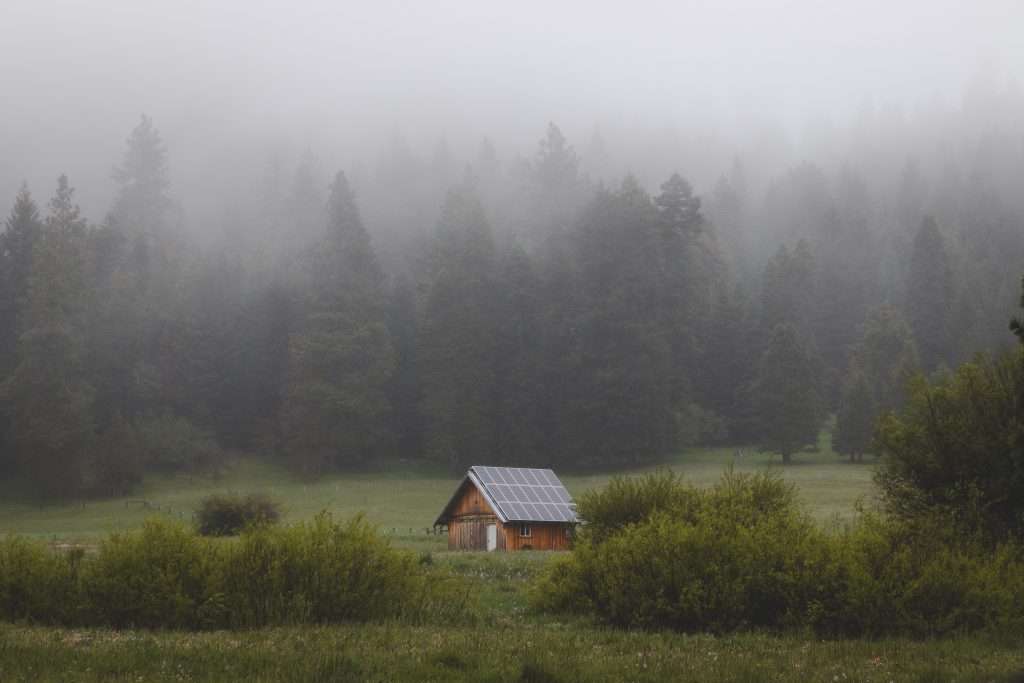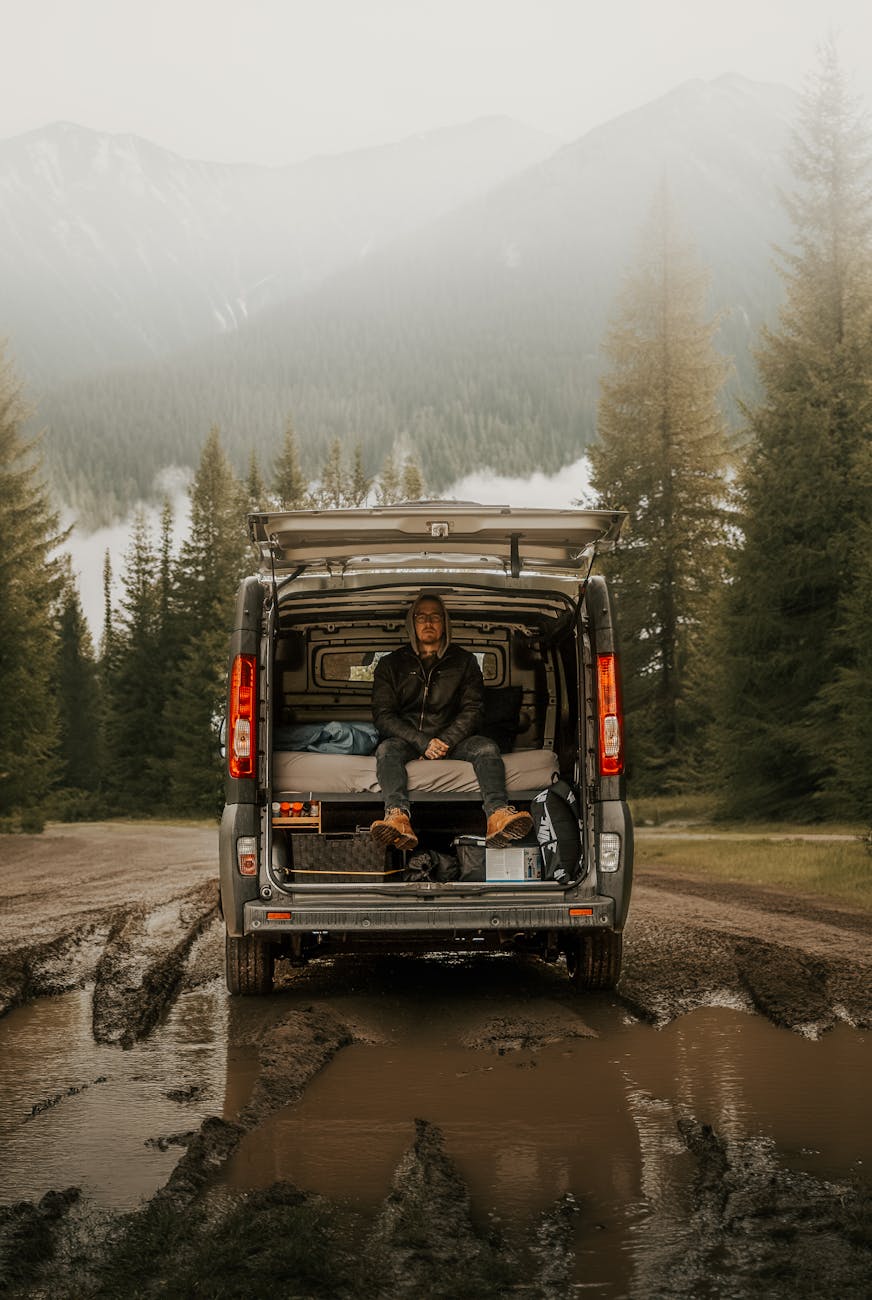Do you dream of going off-grid? You can make that dream come true, and you don’t need to win the lottery to do so. Read on to learn how to make the shift.

Do you dream of getting out of the maze and going off-grid?
Of harnessing your own electricity and heat from solar panels, wind power and biogas? Of getting your own water from a well, a nearby spring or your own rain barrels?
Would you like to live in peace with nature? A life free from financial worries and drama.
How to make the shift
Going off-grid does not need to remain a dream. To go off-grid and acquire a home that will run itself is quite simple, practically speaking. You simply need either money or connections. There are off-grid solutions for all wallets. Land can be either purchased or rented, monthly or annually by exchange of money or services. Some land owners may even let you live there for free. Especially if you grow your own food.
More and more land owners want to improve the biodiversity on their land. One way of doing so is sharing the land with other people who grow their own food. There are plenty of land owners who are agreeable and appreciate the “unconventional” people who are trying to create a life that is sustainable and self-sufficient.
There are many options when it comes to the kind of homes you can stay in off-grid. To find out which one might be perfect for you, you need to figure out your budget and how mobile you want your home to be.
The content below was originally paywalled.
If you want a somewhat mobile home you can acquire a:
A yurt that you can pack up and take apart whenever you move. [bought or built]
A teepee – same principle there. [bought or built]
A caravan [bought/free]
A gypsywagon [bought or built]
A tiny house on wheels [bought or built]
A van
A bus
If you want a more permanent home (one that will stay still):
A log cabin [bought or built]
A cobhouse [bought or built]
A hobbit home [bought or built]
A tree-house [bought or built]
A container home [bought or built]
A mud hut [bought or built]
A viking home [bought or built]
Budget
Whatever your wallet contains and wherever you reside, there is an option out there for you. Be it with €100 in your pocket or €10’000 in your account, there is a way for you to go off-grid.
The main matters to figure out
When it comes to establishing a sustainable off-grid system, there are some things you need to figure out. Water, electricity, waste removal and how to stay warm or cool.
Off-grid bathroom
The easiest bathroom solution is some sort of composting toilet. If you live in a warm place and don’t mind showering outside, an outdoor bath and a camping shower can be acquired for very little or even for free. A simple shower/bath can be installed indoor quite easily as well. It can even be connected to rain barrels. An outdoor bath heated by fire could be a solution even in colder climates, but depending on the temperature, an indoor solution might be better.
Off-grid food preparation
Your kitchen can be built as elaborate or as simple as you’d like. It can be indoor or outdoor, depending on how close to camping you want to get. Think about yourself, your family if you have one, and your habits.
Are you making plans for a mobile or permanently set dwelling?
What is your budget like?
How do you normally store food and what do you normally eat?
Will you require a freezer or a refrigerator? Would a camping refrigerator/freezer suffice? Is gas an alternative for you?
Do you need an oven or only some hotplates? Will you be cooking indoor or outdoor?
Keeping costs low
Refrigerators, freezers and ovens – heck even full kitchens – can be acquired for free. People give away all sorts of things when they move or want a change in their lives. One simple way to get what you need is to get it from a caravan that is being stripped. Another way could be to get it from a home that is going to be taken apart.
If you live in a warm place, a place that remains warm all year round, you ought to consider an outdoor kitchen. It will give you an entirely different feeling and it will give you a new passion for cooking for sure.
Access to water
The easiest water solutions in my opinion are:
A well
Collecting rainwater
Jugs and a nearby spring
Or a combination of the three.
Free gas
If you manage to get a water heater and a regular heater that runs on gas, there are also ways for you to get gas for free. You can keep a home biogas system that turns your food and garden waste into gas. That gas can be used for your heating system and your stove/oven. Theoretically you could even use the gas for your car, if you have one that can run on biogas.
Waste removal off-grid
There are other waste solutions apart from biogas. You can use your waste and turn it into something else. Repurpose it, if you will. Cardboard and food waste can be composted. Cardboard can also be laid down on top of lawns when you’re in the process of turning them into food gardens. Plastic can be melted and turned into something new, or repurposed. Pet bottles can be used to make mini greenhouses or large ones. Jugs can be turned into mini green houses. Smaller plastic items can also be pushed into pet bottles to create plastic bricks.
Glass bottles can be washed and reused, or heated and turned into something else. The necks can be removed to turn bottles into glasses, and the edges can be expanded to turn those glasses into bowls.
Metal can be recycled and in some cases, used to create art.
You can either create a warm compost or a bokashi. Both will turn your food waste into soil, compost and fertiliser for your garden.
Solar panels
If you are getting solar panels and combine them with appliances that are all run on electricity, you’ll want to get products that are 12V or 24V. Not the regular ones they sell in regular tech stores. Most can be acquired for free if you ask around. Consider setting up a WANTED list on Craigslist or in the Facebook marketplace. You’d be surprised at how much you can get for free. If you have an electric car or other vehicle, you can connect it to the solar panels and charge it that way. You’d have to have a lot of sun though.
For a smaller home you can get by on one or two 160 Watt solar panels – flexible ones are recommended, as well as an inverter, a backup battery with at least 250 ah and a water pump for your rain barrels or your well. A filtering system for your water would also be good. You can get all of that for about around €500-€1500, even less if you get some or all of it second hand or during one of the large sales during the year. I know there are those who build their own solar panels, so if you are tech-savvy and good with your hands, that could be worth looking into.
When relying on solar panels all year round, it is recommended to combine them with one or two wind-turbines to make sure your system charges during any and all kinds of weather. Or if you are living close to water, you could harvest electricity through the water as well.
Keeping a food survival garden
Growing your food by your house is easy enough, even more so if you are vegan. Consider the climate, the amount of sun you can expect and what kind of food you eat. Food can also be foraged and acquired for free if you know where to look for it. Most foods you now buy can be made from scratch.
When it comes to storing your vegetables, fruit and berries, consider building a root cellar or if you want the quick and easy DIY version, dig a hole, put in a non-working box or freezer box in there and install a lock. The ground will keep the food cool. You’ll want to check on it regularly though.
Free materials
If you decide to build your own home, free materials can be acquired from stores. If it is something they can’t sell anymore, something with a defect, they may give it away or for a symbolic cost. You can also get free materials from homes that are being taken down. Or you can use pallets as a building material.
If you are making a cob home, most parts of the cob can be acquired for free. With any home, portable or otherwise, good insulation and ventilation is crucial. Do your research and figure out what you’ll need to make that happen, and how to use it.
There are many more or less free ways to build a home, and plenty of expensive mistakes you could make. If you are not savvy yourself, talk to people who are. It is a learning curve, but you can make the pits less deep by asking the right questions and learning as much as you can before you get started.
Good luck!
Discover more from Desoullife
Subscribe to get the latest posts sent to your email.
